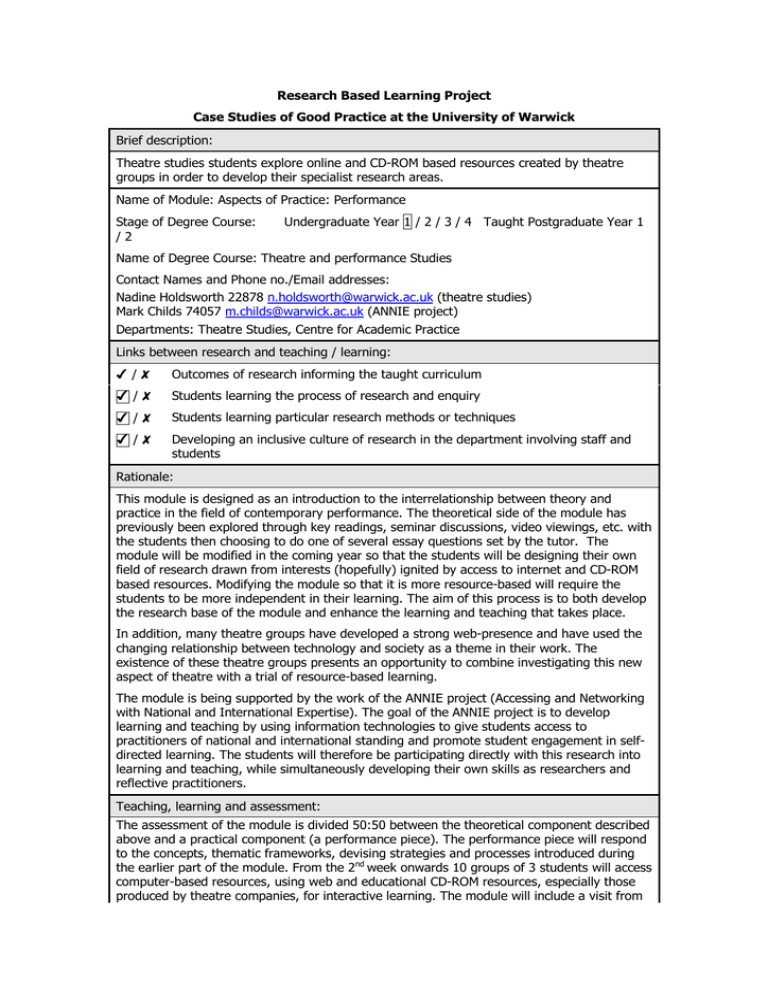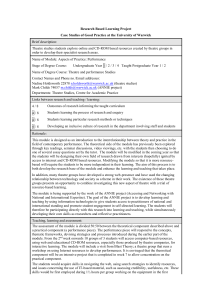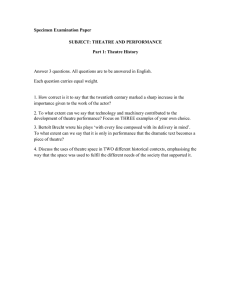Research Based Learning Project Brief description:
advertisement

Research Based Learning Project Case Studies of Good Practice at the University of Warwick Brief description: Theatre studies students explore online and CD-ROM based resources created by theatre groups in order to develop their specialist research areas. Name of Module: Aspects of Practice: Performance Stage of Degree Course: /2 Undergraduate Year 1 / 2 / 3 / 4 Taught Postgraduate Year 1 Name of Degree Course: Theatre and performance Studies Contact Names and Phone no./Email addresses: Nadine Holdsworth 22878 n.holdsworth@warwick.ac.uk (theatre studies) Mark Childs 74057 m.childs@warwick.ac.uk (ANNIE project) Departments: Theatre Studies, Centre for Academic Practice Links between research and teaching / learning: 4/8 Outcomes of research informing the taught curriculum 4/8 Students learning the process of research and enquiry 4/8 Students learning particular research methods or techniques 4/8 Developing an inclusive culture of research in the department involving staff and students Rationale: This module is designed as an introduction to the interrelationship between theory and practice in the field of contemporary performance. The theoretical side of the module has previously been explored through key readings, seminar discussions, video viewings, etc. with the students then choosing to do one of several essay questions set by the tutor. The module will be modified in the coming year so that the students will be designing their own field of research drawn from interests (hopefully) ignited by access to internet and CD-ROM based resources. Modifying the module so that it is more resource-based will require the students to be more independent in their learning. The aim of this process is to both develop the research base of the module and enhance the learning and teaching that takes place. In addition, many theatre groups have developed a strong web-presence and have used the changing relationship between technology and society as a theme in their work. The existence of these theatre groups presents an opportunity to combine investigating this new aspect of theatre with a trial of resource-based learning. The module is being supported by the work of the ANNIE project (Accessing and Networking with National and International Expertise). The goal of the ANNIE project is to develop learning and teaching by using information technologies to give students access to practitioners of national and international standing and promote student engagement in selfdirected learning. The students will therefore be participating directly with this research into learning and teaching, while simultaneously developing their own skills as researchers and reflective practitioners. Teaching, learning and assessment: The assessment of the module is divided 50:50 between the theoretical component described above and a practical component (a performance piece). The performance piece will respond to the concepts, thematic frameworks, devising strategies and processes introduced during the earlier part of the module. From the 2nd week onwards 10 groups of 3 students will access computer-based resources, using web and educational CD-ROM resources, especially those produced by theatre companies, for interactive learning. The module will include a visit from Blast Theory; a theatre group that runs a workshop on using Internet resources to develop performances. It is envisaged that the theoretical component will be an intensive project that is completed in week 7 to allow concentration on the practical component. The students would acquire skills in navigating the web, using search strategies to identify resources, and issues concerning the use of IT-based material, such as assessing credibility, usefulness, etc. These skills would be first employed during 1½ hours per group working on the equipment in the first instance in a controlled environment during one of the regular timeslots, and could be completed in the students’own time. The research process would also become more student-centred than previously and far more collaborative. A web-based discussion board to support the development of ideas between students will be introduced. Advantages: This version of the module depends far more on the students’own abilities to develop collaborative working, autonomous learning, reflective practice and self-motivation to develop students’own specialisms and their ability to develop and design research. It should therefore be a more effective learning experience for the students. Disadvantages: The advantages above also demand far more of the students and will probably be the first time these students will have been in a situation that requires these skills. This requires far more of the students, in addition to the academic content of the course. Enabling the students to meet these requirements will require careful planning of the activities within the course, so that the students' skills are developed incrementally and their learning is supported effectively. Feedback from students: The first trial of this module will take place in the second term of 2001/02. Future developments: As part of the ANNIE project and another FDTL project (ReP - The Performance Reflective Practice Project) the findings of this module will be shared with De Montfort University to inform their activity with a similar module in the 2002/03 academic year. This will enable a further exploration of the effectiveness of the learning and teaching methodology developed in this case study and an opportunity to trial it within another environment.





